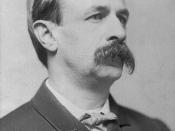Looking Backward is a utopian novel describing a completely different world to that of Bellamy's day. However, it's not that different to the 19th Century, with attitudes to women basically the same. To counteract that, there is no notion of class, with everybody having the same opportunities. Therefore there is a mixture of reform and conservatism in this novel.
So reform jostles with conservatism and despite the changes, things haven't changed that much. Looking Backward is a conservative novel with the beliefs and values system modelled on Bellamy's strict, Calvinist views.
In Bellamy's 2000 women's roles haven't changed much. The main role of Edith and Mrs Leete is to look after Julian West that is almost all. Edith is the one who does the shopping another very stereotyped task. The roles of men and women are segregated, so it seems; "ÃÂBeneath the surface"æ lies the sexual segregation of separate and unequal women's lives.'1
In fact, women are not considered as intellectual despite the fact that they do also receive an education. Edith and Mrs Leete are never involved in highbrow debates and retire from the room before Mr West and Dr Leete start to discuss things.
Edith's principal job is to attend to Mr West claiming ""ÃÂI would do anything to help you that I could.'"ÃÂ That's almost all she seems to do, showing Mr West around New Boston or showing him how to do things. None of the men in the novel do any women's jobs; it's still the women who care for their father or husband. It's only Dr. Leete who discusses the new Year 2000 with Mr West and so in these ways the novel is really conservative. "ÃÂThey are icons for men's inspiration, flagellants for masculine ambition and prizes'2 for the most successful men. Fundamentally, women still aren't taken seriously in this new Boston despite all Dr Leete's talk of a new status for women.
It could be said from reading the novel thoroughly that women are only interested in jobs suiting a woman. It's true that the most prestigious jobs in the country are men-only. So 19th Century America shows through with a still very sexist viewpoint. Indeed on pg. 185 Dr Leete says that men "ÃÂonly permit them to work at all because it is fully understood that a certain regular requirement of labour"æ is well for body and mind.'"àThis is another good example of Bellamy being traditional, and this is typical of the general 19thC view of women.
Men don't do women's jobs, like shopping, either. That's Edith's job and a very sexist position giving a strong sense of division between men and women. Dr Leete remarks that "ÃÂthe sexes now meet with the ease of equals.'"ÃÂ but this is highly debatable. Edith only ever seems to be at home despite being of "ÃÂworking age'. Either that, or doing things a woman would do in the 19thC.
There are very strict rules for Bellamy's Utopia that go for everybody, not just women. There is no such thing as an individual or being different; everybody has to be the same, no two ways about it. This society is very conservative, as it is a highly Christian one, not allowing for any variation in life. Everybody leads a modest, unvarying life and material possessions are not prized.
In other words, any deviation is frowned upon and even occasionally heavily punished. As people live modestly they lead a model Christian life. Indeed a few comparisons can be to 19th Century America, seeing as Bellamy only had the society he could see and his upbringing to go on. His up-bringing especially was a big influence as well as the German law system which he had studied when visiting his cousin in Germany.2 That is, it could be said, why the book is very rule-bound and conservative "ÃÂ there doesn't appear to be much choice- you get what you're given and that's that.
Yet, at the same time Bellamy contradicts himself by giving a feeling of isolationism that is pointed out by M. Abrash; he makes the point that Julian West is told a lot about this new society but shown very little.3 In fact, we barely meet any other people in the Boston of 2000 than the Leetes and the example given by Abrash is that of the "ÃÂtelephone transmission system' which refutes a supposedly "ÃÂcollectivist society'4.
But it's not only the rules that make it conservative it's the values, beliefs and morals of this 2000. They're very conservative indeed where everybody is religious and their views are very hide-bound. Indeed, all citizens feel it's their duty to work and service ""ÃÂis regarded as so absolutely natural.'"ÃÂ (pg. 69) Again, there's no deviation, no alternative choice "ÃÂ you get what you're given once more. "ÃÂBellamy epitomises the subsumption of individuals to the machine' meaning that regardless of choice the individual is sucked into this party machine of the "ÃÂindustrial army.'5 However, despite its conservatism Looking Backward does contain a lot of reform agendas such as the workforce and the education system, which are very different and give opportunities to all. This Utopian society reflects a lot of Communist ideals with everybody working for "ÃÂthe industrial army' (pg. 124) and getting the same back in return. There does seem to be more reform but the conservatism is quite obscured, so therefore less noticeable.
Looking Backward's 2000 is radically different from the "ÃÂGilded Age' in its look, views on life and money. The people are different and through technology Bellamy has tried to create a classless society and by and large, he's succeeded by eradicating poverty, by introducing a government-run credit scheme where everybody has the same amount of money.
One of the most important issues in this novel is class or moreover, lack of class. Bellamy's 2000 is one solid class which is predominantly white and middle-class with a tradition of eating out and having things done for you. There are no signs of upper class conduct as Edith Leete is the one who does the shopping and there are no servants as such. This novel proposed "ÃÂan Eden-like community in which war, hunger And malice were engineered out of society'6 where all received the same level of education, employment and food. In this way, Utopia is fulfilled, but there's more to the novel than that.
Bellamy aimed in this novel to rectify, at least fictionally, the problems he saw in the Chicopee Falls, the town where he grew up. For the early part of his life he grew amongst social strife and this deeply affected him and heavily influenced his writing. There is class equality throughout the book and no suffering.
A classless society is allowed by the introduction of a credit system, a little like our current credit card system. As there is no longer a need for money, people are left wanting for nothing as they're amply provided for by a national, government-run bank. You could say this was a main feature in the book that would create a perfect society "àin fact "ÃÂmaterial prosperity' (pg. 57) is one of the first things Julian West notices once he wakes up. One of the most noticeable things about this book is that the only thing a person need be is human to receive credit or "ÃÂthat he is a man.' As a solution to political governmental corruption Bellamy essentially abolishes most forms of government replacing it the industrial army. "ÃÂThat there is absolutely no way in which an official"æ could possibly make any profit for himself or anyone else by misuse of his power.' (page 68) This is a massive change in Bellamy's 2000 and one of his more principal ideas.
Removal of a political government was another way to remove competition which Bellamy despised.7 Politicians and political parties were, according to Bellamy, corrupt and demagogic. Essentially part of society's problems. Instead a subtler, fairer form of government was put in place represented by the "ÃÂindustrial army.' This utopia made it so that there was no need for any corruption by the introduction of the credit system.
Not only did everybody receive equal credit, but all credit was controlled by a central, national bank run the nation. First of all, all things capitalist were abolished in order to make way for more Socialist (bordering on Communist) ideals and ways of working. Still, the Boston of 2000 had a distinctly English feel to it. Henry Adams called the Gilded Age "ÃÂone dirty cesspool of vulgar corruption'8 and this is what this 2000 wasn't going to be.
The nation itself is rich, so the quality of life is much better since everybody has an equal share. It "ÃÂdoes not wish the people to deprive themselves of any good thing.' (pg. 85) Simultaneously spendthrifts are catered for by receiving their allowance monthly or weekly instead of yearly. There's also no such thing as a foreign exchange seeing as credit is multinational and works like a credit card today. Not to mention "ÃÂ""æthere is nothing at all answering to you idea of wages'"à(pg. 87) From this quotation it can be seen that the monetary system is totally different.
Another thing that provides equality is the availability of jobs of which there's abundance. No job is worse than another one. For instance waiting is no longer seen as a low job, it wasn't "ÃÂin the slightest degree embarrassing.' (pg. 124) But everybody has a job and nobody escapes until 45. Here, introduced, is the idea of "ÃÂan industrial army.' All workmen must start at the bottom and then work their way up. "ÃÂAll are considered, even the poorest workers "ÃÂshould be able to cherish the ambition of rising.' (pg. 107) and be happy at least.
Another radical change in this book is the role of women. No longer just housewives but fully functional members of society; they work and earn almost just as equally as men. Bellamy saw that women were suffering in the 19th C so he corrected that in a way he saw fit. "ÃÂOur women, as well as men, are members of the industrial army' (pg. 184) and indeed they were included in every single way.
The reform carries on with women having more freedom of choice in what they do. They don't have to stay at home and only when they have a baby do they leave their jobs. This a much fairer way of life and works out very well. Not only that but women or girls were able to choose their lovers for reasons other than money. "ÃÂThere are nothing but love matches"æ' (pg. 191) this was one of the more striking things in the book, not to mention a complete break from 19th Century standards.
Finally perhaps one of the most striking features of the new Boston is the new buildings and complete redesign of the city. Bellamy rids it completely of pollution and dirt, which he saw as "ÃÂGolgotha'9, and one of the biggest problems of the 19th Century. "ÃÂ"I really think that the complete absence of chimneys and their smoke is what really impressed me.'"ÃÂ (page 57) West can't get over the change at first; his amazement is complete.
Instead of "ÃÂprivate luxury', the money is spent on keeping the city tidy and clean which West translates into "ÃÂmaterial prosperity.' This utopia is the "ÃÂmillennial city of God'10 religion being central to Bellamy's ethos. The 19th Century gives way to a new dawning with wide streets and brand new houses in which there is hope and re-birth.
There the main debate ends. Which is it to be? Is Looking Backward a conservative novel or a complete break and a new start? To me it's not a case of one or the other, but a mixture. My conclusion is this: despite all his good intentions, Bellamy remains firmly fixed in the 19th Century with his policy's for women only causing wider segregation between men and women and individuality frowned upon. However, there are many earnest reform issues here from the abolishment of class to the redesign of the city. Make what you will of this book, but its complex nature means there is no single conclusion; Looking Backward concentrates on both conservatism and reform issues.
Looking Backward is a utopian novel describing a completely different world to that of Bellamy's day. However, it's not that different to the 19th Century, with attitudes to women basically the same. To counteract that, there is no notion of class, with everybody having the same opportunities. Therefore there is a mixture of reform and conservatism in this novel.
So reform jostles with conservatism and despite the changes, things haven't changed that much. Looking Backward is a conservative novel with the beliefs and values system modelled on Bellamy's strict, Calvinist views.
In Bellamy's 2000 women's roles haven't changed much. The main role of Edith and Mrs Leete is to look after Julian West that is almost all. Edith is the one who does the shopping another very stereotyped task. The roles of men and women are segregated, so it seems; "ÃÂBeneath the surface"æ lies the sexual segregation of separate and unequal women's lives.'1 In fact, women are not considered as intellectual despite the fact that they do also receive an education. Edith and Mrs Leete are never involved in highbrow debates and retire from the room before Mr West and Dr Leete start to discuss things.
Edith's principal job is to attend to Mr West claiming ""ÃÂI would do anything to help you that I could.'"ÃÂ That's almost all she seems to do, showing Mr West around New Boston or showing him how to do things. None of the men in the novel do any women's jobs; it's still the women who care for their father or husband. It's only Dr. Leete who discusses the new Year 2000 with Mr West and so in these ways the novel is really conservative. "ÃÂThey are icons for men's inspiration, flagellants for masculine ambition and prizes'2 for the most successful men. Fundamentally, women still aren't taken seriously in this new Boston despite all Dr Leete's talk of a new status for women.
It could be said from reading the novel thoroughly that women are only interested in jobs suiting a woman. It's true that the most prestigious jobs in the country are men-only. So 19th Century America shows through with a still very sexist viewpoint. Indeed on pg. 185 Dr Leete says that men "ÃÂonly permit them to work at all because it is fully understood that a certain regular requirement of labour"æ is well for body and mind.'"àThis is another good example of Bellamy being traditional, and this is typical of the general 19thC view of women.
Men don't do women's jobs, like shopping, either. That's Edith's job and a very sexist position giving a strong sense of division between men and women. Dr Leete remarks that "ÃÂthe sexes now meet with the ease of equals.'"ÃÂ but this is highly debatable. Edith only ever seems to be at home despite being of "ÃÂworking age'. Either that, or doing things a woman would do in the 19thC.
There are very strict rules for Bellamy's Utopia that go for everybody, not just women. There is no such thing as an individual or being different; everybody has to be the same, no two ways about it. This society is very conservative, as it is a highly Christian one, not allowing for any variation in life. Everybody leads a modest, unvarying life and material possessions are not prized.
In other words, any deviation is frowned upon and even occasionally heavily punished. As people live modestly they lead a model Christian life. Indeed a few comparisons can be to 19th Century America, seeing as Bellamy only had the society he could see and his upbringing to go on. His up-bringing especially was a big influence as well as the German law system which he had studied when visiting his cousin in Germany.2 That is, it could be said, why the book is very rule-bound and conservative "ÃÂ there doesn't appear to be much choice- you get what you're given and that's that.
Yet, at the same time Bellamy contradicts himself by giving a feeling of isolationism that is pointed out by M. Abrash; he makes the point that Julian West is told a lot about this new society but shown very little.3 In fact, we barely meet any other people in the Boston of 2000 than the Leetes and the example given by Abrash is that of the "ÃÂtelephone transmission system' which refutes a supposedly "ÃÂcollectivist society'4.
But it's not only the rules that make it conservative it's the values, beliefs and morals of this 2000. They're very conservative indeed where everybody is religious and their views are very hide-bound. Indeed, all citizens feel it's their duty to work and service ""ÃÂis regarded as so absolutely natural.'"ÃÂ (pg. 69) Again, there's no deviation, no alternative choice "ÃÂ you get what you're given once more. "ÃÂBellamy epitomises the subsumption of individuals to the machine' meaning that regardless of choice the individual is sucked into this party machine of the "ÃÂindustrial army.'5 However, despite its conservatism Looking Backward does contain a lot of reform agendas such as the workforce and the education system, which are very different and give opportunities to all. This Utopian society reflects a lot of Communist ideals with everybody working for "ÃÂthe industrial army' (pg. 124) and getting the same back in return. There does seem to be more reform but the conservatism is quite obscured, so therefore less noticeable.
Looking Backward's 2000 is radically different from the "ÃÂGilded Age' in its look, views on life and money. The people are different and through technology Bellamy has tried to create a classless society and by and large, he's succeeded by eradicating poverty, by introducing a government-run credit scheme where everybody has the same amount of money.
One of the most important issues in this novel is class or moreover, lack of class. Bellamy's 2000 is one solid class which is predominantly white and middle-class with a tradition of eating out and having things done for you. There are no signs of upper class conduct as Edith Leete is the one who does the shopping and there are no servants as such. This novel proposed "ÃÂan Eden-like community in which war, hunger And malice were engineered out of society'6 where all received the same level of education, employment and food. In this way, Utopia is fulfilled, but there's more to the novel than that.
Bellamy aimed in this novel to rectify, at least fictionally, the problems he saw in the Chicopee Falls, the town where he grew up. For the early part of his life he grew amongst social strife and this deeply affected him and heavily influenced his writing. There is class equality throughout the book and no suffering.
A classless society is allowed by the introduction of a credit system, a little like our current credit card system. As there is no longer a need for money, people are left wanting for nothing as they're amply provided for by a national, government-run bank. You could say this was a main feature in the book that would create a perfect society "àin fact "ÃÂmaterial prosperity' (pg. 57) is one of the first things Julian West notices once he wakes up. One of the most noticeable things about this book is that the only thing a person need be is human to receive credit or "ÃÂthat he is a man.' As a solution to political governmental corruption Bellamy essentially abolishes most forms of government replacing it the industrial army. "ÃÂThat there is absolutely no way in which an official"æ could possibly make any profit for himself or anyone else by misuse of his power.' (page 68) This is a massive change in Bellamy's 2000 and one of his more principal ideas.
Removal of a political government was another way to remove competition which Bellamy despised.7 Politicians and political parties were, according to Bellamy, corrupt and demagogic. Essentially part of society's problems. Instead a subtler, fairer form of government was put in place represented by the "ÃÂindustrial army.' This utopia made it so that there was no need for any corruption by the introduction of the credit system.
Not only did everybody receive equal credit, but all credit was controlled by a central, national bank run the nation. First of all, all things capitalist were abolished in order to make way for more Socialist (bordering on Communist) ideals and ways of working. Still, the Boston of 2000 had a distinctly English feel to it. Henry Adams called the Gilded Age "ÃÂone dirty cesspool of vulgar corruption'8 and this is what this 2000 wasn't going to be.
The nation itself is rich, so the quality of life is much better since everybody has an equal share. It "ÃÂdoes not wish the people to deprive themselves of any good thing.' (pg. 85) Simultaneously spendthrifts are catered for by receiving their allowance monthly or weekly instead of yearly. There's also no such thing as a foreign exchange seeing as credit is multinational and works like a credit card today. Not to mention "ÃÂ""æthere is nothing at all answering to you idea of wages'"à(pg. 87) From this quotation it can be seen that the monetary system is totally different.
Another thing that provides equality is the availability of jobs of which there's abundance. No job is worse than another one. For instance waiting is no longer seen as a low job, it wasn't "ÃÂin the slightest degree embarrassing.' (pg. 124) But everybody has a job and nobody escapes until 45. Here, introduced, is the idea of "ÃÂan industrial army.' All workmen must start at the bottom and then work their way up. "ÃÂAll are considered, even the poorest workers "ÃÂshould be able to cherish the ambition of rising.' (pg. 107) and be happy at least.
Another radical change in this book is the role of women. No longer just housewives but fully functional members of society; they work and earn almost just as equally as men. Bellamy saw that women were suffering in the 19th C so he corrected that in a way he saw fit. "ÃÂOur women, as well as men, are members of the industrial army' (pg. 184) and indeed they were included in every single way.
The reform carries on with women having more freedom of choice in what they do. They don't have to stay at home and only when they have a baby do they leave their jobs. This a much fairer way of life and works out very well. Not only that but women or girls were able to choose their lovers for reasons other than money. "ÃÂThere are nothing but love matches"æ' (pg. 191) this was one of the more striking things in the book, not to mention a complete break from 19th Century standards.
Finally perhaps one of the most striking features of the new Boston is the new buildings and complete redesign of the city. Bellamy rids it completely of pollution and dirt, which he saw as "ÃÂGolgotha'9, and one of the biggest problems of the 19th Century. "ÃÂ"I really think that the complete absence of chimneys and their smoke is what really impressed me.'"ÃÂ (page 57) West can't get over the change at first; his amazement is complete.
Instead of "ÃÂprivate luxury', the money is spent on keeping the city tidy and clean which West translates into "ÃÂmaterial prosperity.' This utopia is the "ÃÂmillennial city of God'10 religion being central to Bellamy's ethos. The 19th Century gives way to a new dawning with wide streets and brand new houses in which there is hope and re-birth.
There the main debate ends. Which is it to be? Is Looking Backward a conservative novel or a complete break and a new start? To me it's not a case of one or the other, but a mixture. My conclusion is this: despite all his good intentions, Bellamy remains firmly fixed in the 19th Century with his policy's for women only causing wider segregation between men and women and individuality frowned upon. However, there are many earnest reform issues here from the abolishment of class to the redesign of the city. Make what you will of this book, but its complex nature means there is no single conclusion; Looking Backward concentrates on both conservatism and reform issues.





